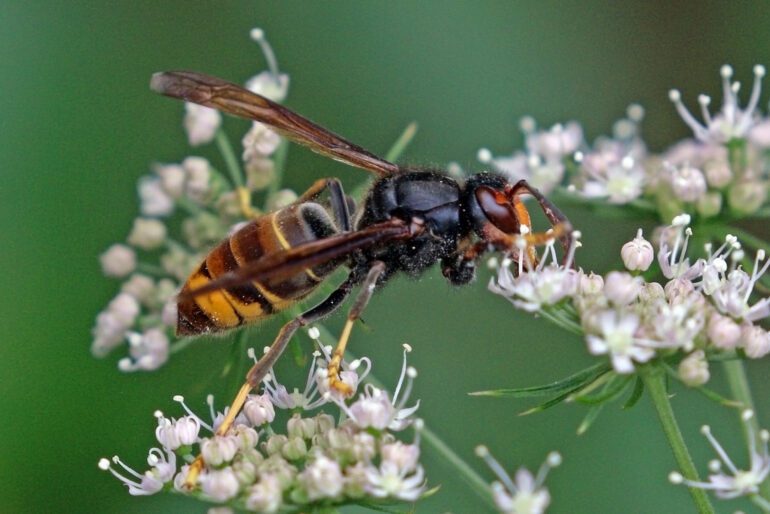Main AI News:
- Devon University unveils VespAI, an AI-driven system designed to detect invasive Asian hornets.
- VespAI utilizes automated monitoring stations to capture standardized images, achieving nearly perfect accuracy in species identification.
- Dr. Thomas O’Shea-Wheller emphasizes VespAI’s cost-effectiveness and accessibility for governments and beekeepers.
- Initial trials in the Channel Islands yield promising results, showcasing VespAI’s potential as a robust early warning system.
- Powered by a compact processor, VespAI activates upon detecting an insect within hornet size parameters, swiftly alerting users to Asian hornet sightings.
- The urgency of the innovation stems from record Asian hornet sightings in the UK in 2023, posing a severe threat to honeybee populations and biodiversity.
- Dr. Peter Kennedy underscores VespAI’s role in providing vigilant, accurate, and automated surveillance, while prioritizing environmental preservation.
- Testing in Jersey demonstrates VespAI’s exceptional accuracy, minimizing misidentifications and ensuring thorough hornet detection.
- The interdisciplinary collaboration behind VespAI’s development highlights the synergy between biologists and data scientists at Devon University.
Cutting-edge artificial intelligence (AI) developed by scientists at Devon University promises a breakthrough in the detection of invasive Asian hornets, according to recent announcements. The University of Exeter revealed that its researchers have devised an automated system, dubbed VespAI, which lures hornets to a monitoring station and captures standardized images for analysis. With “almost perfect accuracy,” this system can identify the targeted species, significantly advancing the battle against this ecological threat.
Dr. Thomas O’Shea-Wheller, affiliated with the Environment and Sustainability Institute at Exeter’s Penryn Campus in Cornwall, emphasized the project’s aim to create a solution that is both cost-effective and versatile. He underlined the accessibility of VespAI, suggesting its potential use by governments and individual beekeepers alike. Initial trials conducted in the Channel Islands yielded “encouraging” results, paving the way for broader implementation.
Powered by a compact processor, VespAI remains dormant until its sensors detect an insect within the size range of a hornet. Once activated, its AI algorithm swiftly analyzes captured images, distinguishing between the Asian hornet (Vespa velutina) and the native European hornet (Vespa crabro). Upon detecting an Asian hornet, the system promptly alerts the user with an image, enabling swift confirmation of the identification.
The urgency of this innovation stems from the surge in Asian hornet sightings across the UK in 2023, noted as “record numbers” by the University of Exeter. These hornets pose a severe threat to honeybee populations, wreaking havoc on hives and biodiversity. With nests already discovered in various UK regions, including East Sussex, Kent, Devon, and Dorset, effective surveillance and response strategies are crucial.
Dr. Peter Kennedy, the mind behind the conceptualization of VespAI, highlighted the prevalence of misidentified reports in current surveillance efforts. He stressed the system’s role in providing vigilant, accurate, and automated surveillance to address this challenge effectively. Crucially, VespAI’s design prioritizes environmental preservation by avoiding the indiscriminate killing of non-target insects while ensuring the capture and tracking of live hornets back to their nests for eradication.
During testing in Jersey, which experiences frequent Asian hornet incursions due to its proximity to France, VespAI demonstrated exceptional accuracy. Dr. O’Shea-Wheller emphasized that the system’s high precision minimizes the risk of misidentifying other species while ensuring that no Asian hornet escapes detection. This groundbreaking project united biologists and data scientists from various institutes at the University of Exeter, showcasing interdisciplinary collaboration at its finest.
Conclusion:
Devon University’s breakthrough AI system, VespAI, marks a significant advancement in the market for invasive species detection and surveillance. With its high accuracy, cost-effectiveness, and environmental considerations, VespAI presents lucrative opportunities for government agencies, environmental organizations, and beekeeping industries to enhance their monitoring and response strategies against ecological threats like the Asian hornet. This innovation underscores the growing importance of AI-driven solutions in safeguarding biodiversity and mitigating environmental risks.

